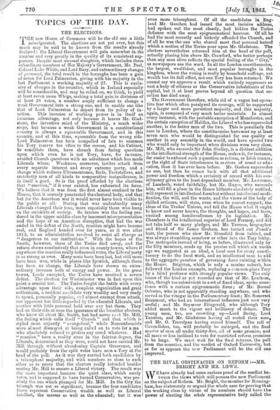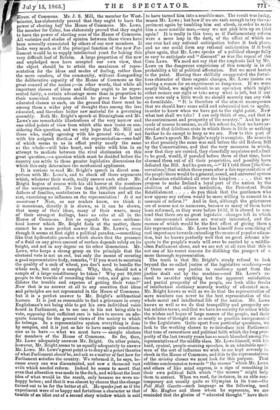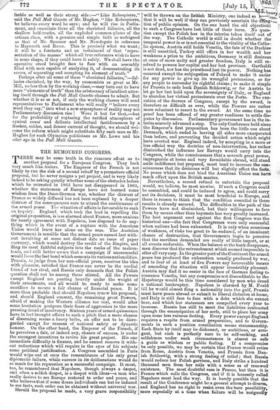THE RIVAL OBSTINACIES ON REFORM :—MR. BRIGHT AND MR. LO
WE.
WE have already had some curious proof of the conflict be- tween the views which will possess the new Parliament on the subject of Reform. Mr. Bright, the member for Birming- ham, has elaborately re-argued the whole case for proving that the worki g class by virtue of its numbers should have the power of electing the whole representative body called the °use. of Commons. Mr. J. S. Mill, the member for West- minster, has elaborately proved that they ought to have the power of electing half the House of Commons. Mr. Lowe, the member for Caine, has elaborately proved that they ought to have the power of electing none of the House of Commons. All varieties and shades of opinion between these views have been severally enunciated by others of our new members. It looks very much as if the principal function of the new Par- liament would be to supply intellectual yeast for baking this very difficult loaf of Reform. A large proportion of the new and unpledged men have accepted our own view, that the object should be to attain the maximum of repre- sentation for the ideas and modes of feeling, rather than the mere numbers, of the community, without disregarding the deliberative capacity of the House of Commons as the great council of the nation ;—in other words, that while all important classes of ideas and feelings ought to be repre- sented fairly, a certain advantage more than in. proportion to their numerical weakness should be given to the better educated classes as such, on the ground that there must be among them a wider play of thought than among the less educated, and therefore better raw material for a governing assembly. Both Mr. Bright's speech at Birmingham and Mr. Lowe's are remarkable illustrations of the very narrow and one-sided points of view from which able men insist on con- sidering this question, and we only hope that Mr. Mill and those who, really agreeing with his general view, if not with his assigned fraction of the representation—one-half of which seems to us in effect pretty nearly the same as the whole—will take heart, and unite with him in an attempt to mediate between the rival obstinacies on this great question,—a question which must be decided before the country can settle to those greater legislative discussions for which this only determines the mechanical appliances.
It is curious to read Mr. Bright's speech in direct com- parison with Mr. Lowe's, and to check off those arguments which, whatever their worth, really answer each other. Mr. Bright begins of course with his old horror at the numbers of the unrepresented. No less than 5,000,000 industrious fathers of families, contributors to the taxation and all the rest, exercising no influence on the representation ! Is it not monstrous I Now, as our readers know, we think it is monstrous, directly it is shown, as it can be shown, that many of their ideas, many of their wants, many of their strongest feelings, have no echo at all in the House of Commons. But as regards the mere arithme- tical horror which Mr. Bright feels at the matter, there cannot be a more perfect answer than Mr. Lowe's, even though it seems at first sight a political paradox,—something like that hydrostatic paradox which shows that the pressure of a fluid on any given amount of surface depends solely on its height, and not in any degree on its other dimensions. Mr. Lowe, who keeps a strong grasp on the principle that the -electoral vote is not an end, but only the means of securing -a good representative body, remarks, " If you. want to ascertain the quality of a sack of wheat, you don't need to handle the whole sack, but only a sample. Why, then, should not a sample of a large constituency be taken ? Why put 80,000 people to the trouble of recording their votes, and give can- didates the trouble and expense of getting their votes ?" Now that is no answer at all to any assertion that ideas and principles are not represented in the House of Commons. but it is a perfect answer to Mr. Bright's arithmetical horrors. It is just as reasonable to find a grievance in every Englishman's not being able to get his own individual voice heard in Parliament, as to see one in his not being able to vote, supposing that sufficient care is taken to secure an ade- quate hearing for the general views of the society to which he belongs. In a representative system everything is done by samples, and it is just as fair to have sample constituen- cies as to have — what we must have — sample electors for members of the House of Commons. So far, then, Mr. Lowe adequately answers Mr. Bright. On other points, however, Mr. Bright seems to us equally adequately to answer Mr. Lowe. Mr. Lowe's great point is to deny all a priori theories of what Parliament should be, and ask as s matter of fact how far Parliament satisfies the country. We reformed it, he says, be- cause every one was discontented, and saw a thousand vast evils which needed reform. Indeed he seems to assert that even that alteration was made in the dark, and without the least idea of what would be the result, only because we were un- happy before ; and that it was almost by chance that the change turned out to be for the better at all. He speaks just as if the experiment were of as happy and fortuitous a character as that tumble of an idiot out of a second story window which is said to have turned him into a sensible man. The result was lucky, muses Mr. Lowe ; but how if we are rash enough to try the ex- periment again by tumbling him out afresh, in order to make him a more sensible man,—may we not pick him up an idiot again? It is really in this tone, as if Parliamentary reform were a mere leap in the dark, of the effect of which no one ever had any rational anticipation before it took place, and no one could form any rational anticipation if it took place again, that Mr. Lowe speaks of a political change fully as easy to anticipate and " discount" as was the repeal of the Corn Laws. We need not say that the emphasis laid by Mr. Lowe on the dangerous empiricism of this remedy is in all probability a bit of political affectation. But we must hasten to the point. Having thus skilfully exaggerated the fortui- tous character of these organic changes, Mr. Lowe insists on having a reason for an experiment so dangerous. If we were nearly blind, we might submit to an operation which might either restore our sight or take away what is left, but if our eyes were only a little weak we should scarcely run any risk so formidable. "It is therefore of the utmost consequence that we should have some solid and substantial test to apply, in order to know when we have got to the right point. Now what test shall we take? I can only think of one, and that is the contentment and prosperity of the country." And he pro- ceeds of course to assume, as all his school do, that we have ar- rived at that felicitous state in which there is little or nothing further to do except to keep as we are. Now to this part of Mr. Lowe's speech Mr. Bright's reply is complete. He reminds us that precisely the same was said before the old Reform Bill by the Conservatives, and that the very measures in which, now that they are carried, they cheerfully acquiesce and admit to be good, would, if paraded before them at that time, have alarmed them out of all their proprieties, and possibly have defeated the Bill. And he goes on,—" If I told them [the Con- servatives] that within three years after a fair representation of the people there would be a general, sound, and universal system of education established all over the kingdom . . . . that we propose to make Ireland a loyal part of the nation by the abolition of that odious institution, the Protestant State Establishment . . . . do you think that the gentlemen who now oppose any reform would be more willing to consent to a measure of reform ?" And in fact, although the grievances are of course not so numerous, because so many of them have been reformed, as they were before 1832, it is absurd to con- tend that there are no great legislativ changes left in which. the unrepresented classes are warmly interested, and the success of which would be the first effect of giving them a fair representation. Mr. Lowe has himself done something of real importance towards extending the means of popular educa tion, but he knows perfectly well that no great scheme ade- quate to the people's wants will ever be carried by a middle- class Parliament alone, and we are not at all sure that this is not one of his secret reasons for disliking the prospect of a more thorough representation.
The truth is that Mr. Bright's steady refusal to look beyond the so-called justice of the legislative machinery—as if there were any justice in machinery apart from the justice dealt out by the machine—and Mr. Lowe's re- fusal to consider anything but the apparent satisfaction and partial prosperity of the people, are both alike freaks of intellectual obstinacy scarcely worthy of educated men. Mr. Bright knows as well as we do that the representation of mere numbers can never be the best representation of the whole moral and intellectual life of the nation. Mr. Lowe knows as well as we do that tranquillity and prosperity are but relative terms, and that we have no security for either while the wishes and hopes of large masses of the people, and their whole tone of thought are as nearly as possible unrepresented in the Legislature. Quite apart from particular questions, we look to the working classes to re-introduce into Parliament that tone of earnestness and political faith which the long pros- perity of the last twenty years has so much blanched among the representatives of the middle class. Mr. Lowe himself, with his hard, cynical, people-scorning speeches, is an admirable speci. men of the sort of influence we wish to see kept severely iu check in the House of Commons, and it is to the representatives of the striving classes we must look for this purpose. That sublime condescension towards " the masses " which Mr. Lowe and others of like mind express, is a sign of something in their own political faith which "the masses" might help them to correct. When we read, for instance, in an able con- temporary not usually quite so Olympian in its tone—the Pall Mall Gazette—such language as the following, used of Mr. Hughes and those whom he represents, we are reminded that the glories of " educated thought " have their
feeble as well as their strong side :—" Like Robespierre," said the Pall Mall Gazette of Mr. Hughes, "like Robespierre, he believes every word he says ; and he will rise in Parlia- ment, and enunciate there all the cherished fallacies, all the shallow half-truths, all the exploded common-places of the artizan class, with a genuine and simple faith as unfeigned as that of Mr. Spooner and Mr. Newdegate in reference to Maynooth and Rome. This is precisely what we want; it will be a foretaste and an instalment of that repre- sentation of the masses' which all true reformers wish to have in some shape, if they could have it safely. We shall have the operative creed brought face to face with an assembly filled with men capable of analyzing it, of demonstrating its errors, of separating and accepting its element of truth."
Perhaps after all some of these "cherished fallacies,"—fal - lathes cherished, by the way, by economists as great as Mr. Mill, no less than by the working class,—may turn out to have more "elements of truth" than the aristocracy of intellect utter- ing itself through the Pall Mall Gazette chooses to admit. But whether it is so or not, if only the working classes will send representatives to Parliament who will really " believe every word they say," into what a new atmosphere of reality may not Parliamentary discussion rise ! Were it but for that,—but for the probability of replacing the rarified atmosphere of cynical ennui and delicate intellectual fastidiousness by a fresher, colder, and denser current of thought, we should wel- come the reform which might substitute fifty such men as Mr. Hughes for Buell Olympian politicians as Mr. Lowe and his alter ego in the Pall Mall Gazette.
































 Previous page
Previous page